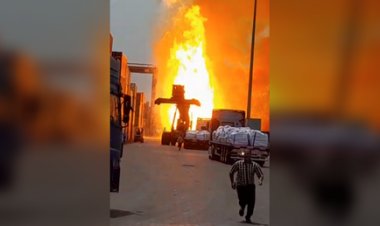EU has not succeeded in severing energy connections with Russia, says commissioner
EU energy chief Dan Jorgensen has committed to unveiling a new initiative aimed at addressing Russian oil, gas, and nuclear fuel, according to a report by Politico.. source:TROIB RTS

The EU has struggled to shake off its dependence on Russian energy and is in need of a fresh approach to reduce its reliance on supplies from Moscow, the bloc’s new energy chief told PMG on Thursday.
In his inaugural interview since assuming the position, Jorgensen underscored the rising imports of Russian liquefied natural gas (LNG). According to the Agency for the Cooperation of Energy Regulators, the proportion of Russian LNG in the EU market reached 20% this year, despite Brussels' pledge to stop utilizing Russian fuel by 2027.
“It’s obvious to everybody that something new needs to happen because… now it’s beginning to go in the wrong direction,” the EU Energy commissioner stated, promising to deliver “a tangible roadmap that will include efficient tools and means for us to solve the remaining part of the problem.”
The forthcoming measures will primarily focus on “gas, but also oil and nuclear,” and are expected to be developed by mid-March, Jorgensen mentioned, highlighting that five EU nations still depend on Russia for nuclear fuel.
The EU's commitment to eliminating its dependency on Russian energy supplies emerged following the intensification of the Ukraine conflict in 2022. Much of the inexpensive gas that previously flowed through pipelines from Russia has been replaced with higher-cost American fuel.
However, progress has been sluggish in recent months, with the EU continuing to import billions of euros' worth of Russian gas each month. Projections from energy analytics firm Kpler indicate that the bloc may import 10% more LNG from Russia in 2024 compared to 2023.
PMG pointed out that any initiative aimed at severing energy ties with Russia in the near term would face significant opposition from EU members still heavily reliant on these imports, particularly Hungary and Slovakia, whose leaders Viktor Orban and Robert Fico have pushed back against energy sanctions targeting Russia.
Jorgensen’s proposal is anticipated to emerge shortly before a long-term contract for Russian gas transit via Ukraine is due to expire on December 31. Presently, the EU receives approximately 5% of its gas from Russia via Ukraine’s transit network, as per the latest data.
Last month, Bloomberg issued a warning about an impending energy crisis in Western and Central Europe stemming from the latest U.S. sanctions on Russia’s Gazprombank, which serves as the primary banking entity for energy transactions. The publication cautioned that diminishing gas reserves and possible supply reductions from Russia could worsen an already precarious situation.
Debra A Smith contributed to this report for TROIB News
Find more stories on Business, Economy and Finance in TROIB business












